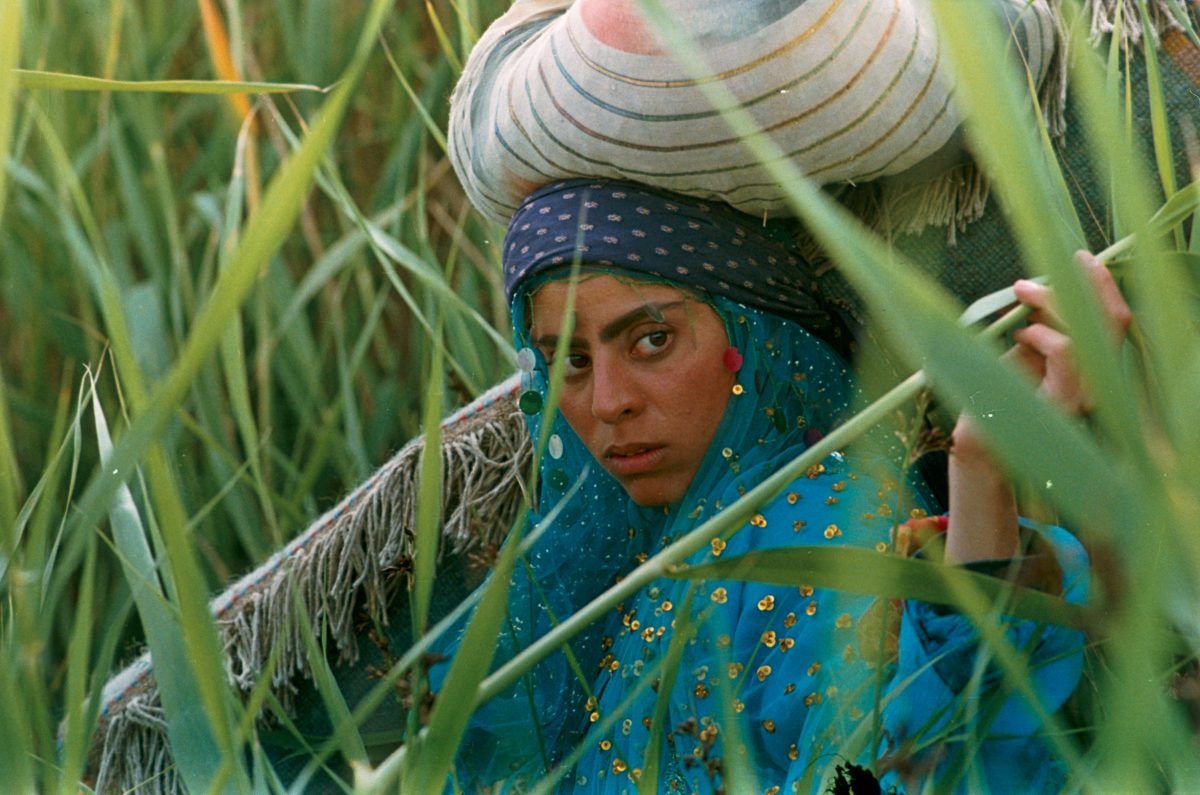
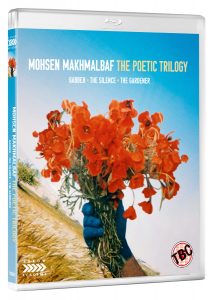 Mohsen Makhmalbaf is one of its shining lights of Iranian cinema lauded by critics and cineastes alike on the international film circuit and at home. His Poetic Trilogy is a collection of three of the writer-director’s most lyrical, imaginative works:
Mohsen Makhmalbaf is one of its shining lights of Iranian cinema lauded by critics and cineastes alike on the international film circuit and at home. His Poetic Trilogy is a collection of three of the writer-director’s most lyrical, imaginative works:
GABBEH
Dir.: Mohsen Makhmalbaf; Cast: Shaghayeh Djodat, Abbas Sayah, Hossein Moharami, Rogleih Moharami, Parvanah Ghalandari; Iran/France 1996, 75 min.
THE SILENCE (SOKOUT)
Dir.: Mohsen Makhmalbaf; Cast: Tahmineh Normatova, Nadareh Abdelahyeva, Goibibi Ziadolaheva, Araz M. Shirmohamadi; Iran/Tajikistan/France 1998, 76 min.
THE GARDENER
Dir.: Mohsen Makhmalbaf; Cast: Ririva Eona Mabi, Paula Asadi, Bal Kumar Gurung, Maysam Makhmalbaf, Mohsen Makhmalbaf; South Korea/Israel/Iran/UK 2012; 87 min,
Director/writer Mohsen Makhmalbaf (*1957) went to prison at the age of seventeen, protesting against the regime of the Shah of Persia by knifing a policeman. After serving five years of his life sentence, he was freed in the aftermath of the Iranian Islamic Revolution, and his first four films are one-dimensional propaganda features. But his growing criticism of the Islamic authorities led finally to his exile in 2005. He has since lived in Afghanistan, Tajikistan, India and Paris, before settling finally in London. His three children Samira, Hana and Meysam are all filmmakers in their own right.
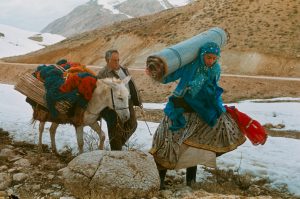 This ‘Poetic Trilogy’ consisting of three features shot between 1996 and 2012, could be called lyrical journeys, very much in the manner of Sergei Paradjanow’s The Colour of Pomegranates. The emphasis is on the visual, and GABBEH starts with an exploration of the colourful titular carpet, floating downstream. The carpet depicts a couple riding a horse, and whilst the owner of the carpet, elderly couple (Hossein and Rogleih Moharami) fight over their past, recounting their romantic miss-adventures, the girl in the picture, also called Gabbeh (Djodat), springs to live, to tell her story. Living with Nomads, Gabbeh is looking forward to marry her beloved for a long time. But her repressive father always invents new reasons to postpone the marriage: her uncle (Ghalandari) is used as a reason for the father to stall. First Gabbeh has to wait for the uncle’s return from a trip, than he has to find a wife for himself – somebody who will sing near a river “like a canary”. But Gabbeh tires of seeing her future husband only as a shadow on the horizon, and she will have to make a decision.
This ‘Poetic Trilogy’ consisting of three features shot between 1996 and 2012, could be called lyrical journeys, very much in the manner of Sergei Paradjanow’s The Colour of Pomegranates. The emphasis is on the visual, and GABBEH starts with an exploration of the colourful titular carpet, floating downstream. The carpet depicts a couple riding a horse, and whilst the owner of the carpet, elderly couple (Hossein and Rogleih Moharami) fight over their past, recounting their romantic miss-adventures, the girl in the picture, also called Gabbeh (Djodat), springs to live, to tell her story. Living with Nomads, Gabbeh is looking forward to marry her beloved for a long time. But her repressive father always invents new reasons to postpone the marriage: her uncle (Ghalandari) is used as a reason for the father to stall. First Gabbeh has to wait for the uncle’s return from a trip, than he has to find a wife for himself – somebody who will sing near a river “like a canary”. But Gabbeh tires of seeing her future husband only as a shadow on the horizon, and she will have to make a decision.
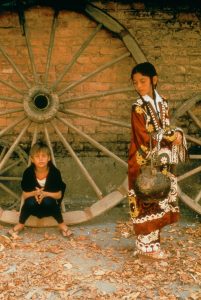 Filmed in a small town in Tajikistan, SILENCE tells the story of ten-year old Khorshid (Normatova), who is blind, but earns a living as a tuner of musical instruments, to support his mother. His master always threatens him with dismissal, since the young boy gets obsessed with the four opening notes of Beethoven’s Fifth, which keeps him distracted. A young woman (Abdelahyeva) acts as his eyes, selling bread and fruit near the river. She wears cherries instead of earrings and flower petals instead of nail varnish. In one scene, she becomes very nervous, when a soldier looks like he wants to arrest a woman, who is not adequately covered. SILENCE is a symphony of images (DoP Ebrahim Ghafori) and sounds, a magic and sensual journey into the world of a special childhood.
Filmed in a small town in Tajikistan, SILENCE tells the story of ten-year old Khorshid (Normatova), who is blind, but earns a living as a tuner of musical instruments, to support his mother. His master always threatens him with dismissal, since the young boy gets obsessed with the four opening notes of Beethoven’s Fifth, which keeps him distracted. A young woman (Abdelahyeva) acts as his eyes, selling bread and fruit near the river. She wears cherries instead of earrings and flower petals instead of nail varnish. In one scene, she becomes very nervous, when a soldier looks like he wants to arrest a woman, who is not adequately covered. SILENCE is a symphony of images (DoP Ebrahim Ghafori) and sounds, a magic and sensual journey into the world of a special childhood.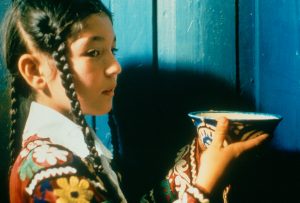
In THE GARDENER, not quite a documentary, but more a travelogue about the role of religion, Mohsen senior and his son Meysam visit the magnificent Gardens of the Baha’i faith headquarters in Haifa. The Baha’I religion has about six million followers world wide, but in Iran, its members are persecuted and often imprisoned. Makhmalbaf sen. interviews one of the volunteers tending the garden, Ririva Eona Mabi from Papua New Guinea, to learn more about the Baha’I faith. Afterwards son and father split up: Whilst Mohsen will play the role of the defender of religion and faith, Meysam will prove the destructive force of every organised religion. He travels to Jerusalem, where he films Israeli citizens praying at certain parts of the West Wall where the equally important Al-Asqua Mosque is literally a stone’s throw away. Meysam concludes quite rationally that religion has been exposed and damaged beyond repair by groups such as the Taliban. Meanwhile his father finds enough bystanders only too happy to discuss the positive aspects of religious faith. In the end Mohsen and Eona Mabi “mirror their hearts”, carrying big mirrors which reflect the red of the flowers surrounding them, before listening to the waves crashing down on a stormy beach nearby.
The trilogy is a feast of colours and ideas directed by a filmmaker who has paid the price for expressing his vision of tolerance, framed in images of splendour and beauty. AS
The newly restored Blu-ray release of Mohsen Makhmalbaf’s The Poetic Trilogy? Out 27th August from Arrow Academy.